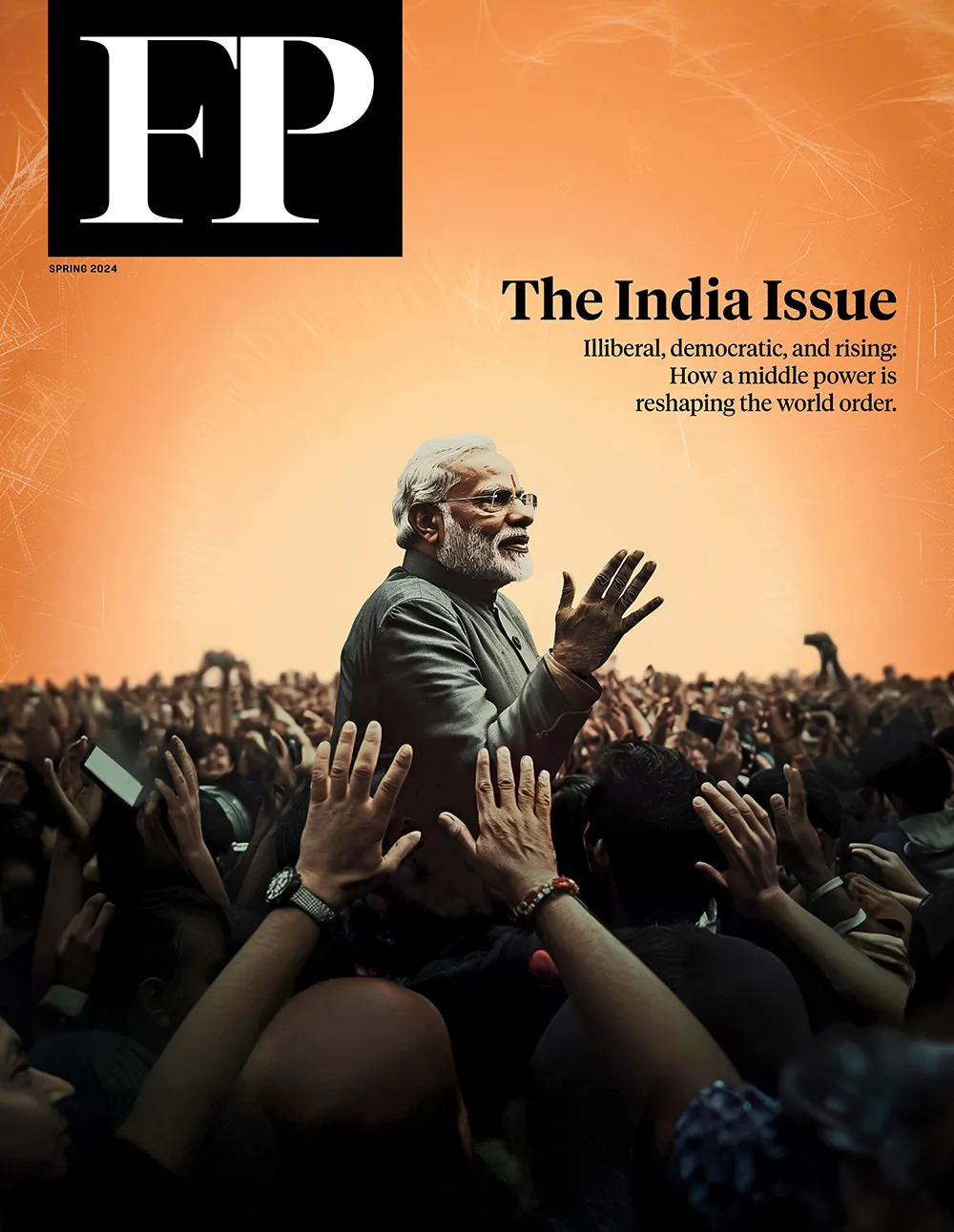The EU’s Balance of Power Is Shifting East
Russia’s war has opened up a vast strategic chasm within the European Union.
Despite the celebratory rhetoric in Brussels about the European Union’s surprisingly robust response to Russia’s invasion of Ukraine—which just culminated in the European Commission’s recommendation of membership candidacy to Ukraine—the war has not united the bloc in any unprecedented or transformative way. In fact, it’s having exactly the opposite effect: Beneath the soaring vista of Ukraine as a catalyst for a more muscular and geopolitically effective EU lie deep divisions, shifting allegiances, and a much more complex reality.
Despite the celebratory rhetoric in Brussels about the European Union’s surprisingly robust response to Russia’s invasion of Ukraine—which just culminated in the European Commission’s recommendation of membership candidacy to Ukraine—the war has not united the bloc in any unprecedented or transformative way. In fact, it’s having exactly the opposite effect: Beneath the soaring vista of Ukraine as a catalyst for a more muscular and geopolitically effective EU lie deep divisions, shifting allegiances, and a much more complex reality.
The war—or, more precisely, key EU members’ completely divergent approaches to Russia and how they expect a postwar peace to look—is altering the very power balance within the bloc itself. And that’s bad news for Germany, France, and the rest of the EU’s traditional powerbrokers.
What the ongoing war has exposed is the failure of Paris’s and Berlin’s transactional approach to the bloc’s members in Central and Eastern Europe as well as the Baltics. For decades, Western Europe has pursued an economically driven model favoring market penetration for Western banks and other companies, supply chains for manufacturers, and a steady flow of cheap labor over any discernible geostrategic focus.
Worse still from the perspective of Eastern EU members, these strictly economic priorities have been accompanied by an increasing Western European effort to push their social and political values onto Eastern European members, such as Poland and Hungary—and link these values to EU funding. Meanwhile, countless warnings from the Eastern capitals about Russia were not just ignored but often ridiculed as paranoid.
The Russian invasion has detached these Western European members’ priorities even further from most EU members in the east. Germany and France’s lack of meaningful and speedy arms deliveries to Ukraine, their futile overtures to Russian President Vladimir Putin, and their long hedging on whether they even want Ukraine to win this war all suggest that they desire nothing more than to return to business as usual with Russia. This has created a strategic chasm that grows wider with every statement coming out of Paris and Berlin. The war has shown, if any proof was needed, that hard power trumps softer tactics of persuasion—a lesson many Western European leaders have long ignored.
The most immediate shift is already obvious. The countries of Central and Eastern Europe know that they are entirely dependent for their security—perhaps even their continued existence as independent countries—on NATO, not the EU. The latter’s inability to counter Russian revanchism in any meaningful way has exposed French delusions of European “strategic autonomy” and shredded the EU’s credibility in security and defense. With Russia not just an object of worry but a live threat, the key players in Europe’s defense for the coming decades won’t be the EU’s traditionally Russia-friendly powerbrokers—Germany and France—but the countries of Central and Eastern Europe, the Baltic and Nordic states, the United States, and Britain.
Security and defense policy, however, is only the catalyst for a reordering of the EU’s political balance. It’s hard to overstate the level of distrust among the Eastern European members created by the barely veiled wish in Berlin, Paris, and Rome to return to normal business relations with Russia. This is already leading to more assertiveness among the Eastern neighbors. Latvian Deputy Prime Minister Artis Pabriks denounced French President Emmanuel Macron’s multiple overtures to the Kremlin as an example of “so called Western leaders who possess [an] explicit need for self humiliation in combination with total detachment from political reality.” Marko Mihkelson, chair of the Estonian parliament’s foreign affairs committee, was equally scathing when he noted: “It is incredible how the leaders of France and Germany are inadvertently paving the way for new acts of violence by Russia.”
In political terms, Paris and Berlin’s conspicuous foot-dragging on military support for Ukraine has shattered the comfortable quid pro quo that has governed relations between Western and Eastern EU members. The former, as net contributors to the EU budget, send tens of billions of euros in funding east each year, whereas the latter deferred to major Western powers for political leadership. With Russia’s attack on Ukraine, French and German leadership on all things related to security and Russia—and their self-serving theories of peace through economic interdependence—were exposed as delusional.
And so a new balance of power is being shaped, whose contours are slowly emerging. Poland, the largest economy in Eastern Europe and the sixth-largest economy in the EU, is central to the increasing empowerment of Central and Eastern Europe. As the war accelerated existing tensions with Brussels, Warsaw has been quick to leverage its leadership in championing Ukraine to broaden the debate about the EU’s future strategic direction. The current Polish government’s vision of a future EU—as what Polish Prime Minister Mateusz Morawiecki calls “a union of strong, equal and free nations”—remains a direct challenge to Paris, Berlin, and Brussels’s visions of integration but only in the policy areas that matter to them and ignoring vital security threats. The Polish view of the EU is shared across much of Central and Eastern Europe.
If the Eastern, Baltic, and Nordic members don’t succeed in shaping the EU’s Russia strategy in ways that overcome French and German inaction, they will look for their security elsewhere—especially by cooperating more closely with non-EU NATO members, such as the United States and Britain. In fact, they already are. When Macron speaks of the EU’s “strategic autonomy” independent of the United States, bright warning lights go off in Eastern EU capitals, where tolerance for this kind of discourse is rapidly shrinking.
The recent move by European Commission President Ursula von der Leyen to release 36 billion euros (or almost $38 billion) in EU recovery aid for Poland—which had been blocked over long-standing concerns about democratic norms in Poland—illustrates Warsaw’s newly indispensable role. As the EU places its urgent need to maintain coherence in the Ukraine war over its concerns about Polish politics, other Central and Eastern European member states will likely test the boundaries of their new influence.
For the EU—and for Paris and Berlin, in particular—this could spell big trouble ahead.
This shifting of political power will impact much more than security and defense policy. In practice, it will radically reduce the ability of the EU to achieve its objectives in other policy areas. Many Eastern European countries share an instinctive conservatism and view of national sovereignty that remains skeptical of the Western EU members’ attempts to cast their own politics into EU-wide policy on climate, migration, or social and democratic values. Poland and Hungary are using their political leverage to oppose an EU-wide minimum tax on the profits of corporations, which the rest of the EU supports. The Czech Republic along with other Eastern EU members view parts of EU climate policy—in particular, the flagship EU Green Deal pushed by Germany and others—as an “existential threat” to its economy.
The fissures in the EU exposed by the Ukraine war will only widen in the future. Already, the Baltics have clearly framed Russia’s aggression as an existential threat to the bloc’s unity. This month, the prime ministers of Latvia and Lithuania, Krisjanis Karins and Ingrida Simonyte, respectively, jointly called for the rest of the EU to ignore the pain of rising energy prices and focus instead on helping Ukraine defeat Russia. Estonian Prime Minister Kaja Kallas was even more explicit in cautioning Western Europe against forcing territorial concessions on Ukraine due to rising conflict fatigue and its deteriorating economic outlook.
If Western European leaders think these are political positions that can be bought off with EU money as in the past, they are in for a rude awakening. Left unchecked, the widening division catalyzed by Russia’s war will shatter the EU’s consensus-driven model for making decisions. If Paris and Berlin continue to focus on ending the war at any cost to Kyiv, Ukraine’s capital, they will only strengthen the narrative that Western Europe’s interest in Eastern affairs is primarily economic. This, in turn, will force more Eastern capitals into following Hungary’s playbook of deliberately blocking key EU decisions—simply because this is their best leverage against a Western Europe that’s already eager to consign Russia’s war to history. This could potentially drive the EU into repeated decision-making chaos.
To be sure, the rise of Central and Eastern Europe in European affairs is by no means guaranteed. France and Germany, together with Italy, remain the EU’s political and economic heavyweights. The recent joint visit of the three countries’ leaders to Kyiv, where they announced their support for Ukraine’s formal designation as a candidate for EU membership, was clearly an attempt to claim ownership of Europe’s approach to the war. Britain, which has emerged as a crucial supporter of Ukraine, remains riven by internal discord and Brexit’s economic fallout—and no longer has a direct voice in the EU. Even Washington’s current commitment to Ukraine and Eastern Europe has a question mark hanging over it given the United States’ focus on geopolitical competition with China and the possible return of the Republican Party to power, where strategic priorities are unclear.
Still, something is clearly shifting within the EU. Nearly two decades ago, then-U.S. Defense Secretary Donald Rumsfeld was ridiculed in Paris and Berlin when he said Europe’s center of gravity was “shifting to the east” away from the “old Europe” dominated by France and Germany. Rumsfeld may have been a little early in describing the shift—but his words seem to finally be coming true today.
Eoin Drea is a political analyst, writer, and senior researcher at the Wilfried Martens Centre for European Studies. Twitter: @EoinDrea
More from Foreign Policy

Morality Is the Enemy of Peace
The conflicts in Gaza and Ukraine can only end with deals that don’t satisfy anyone completely.

Why Biden’s Gaza Gambit Is Likely to Fail
The U.S. president wants a truce more than Israel and Hamas do.

Modi’s Taiwan Ties Have Rattled China
India’s overtures to the island have coincided with a breakdown in its relationship with Beijing.

Don’t Bet Against the Dollar
U.S. competitors are pushing the limits of autonomy within a dollar-based system, but there isn’t a real global alternative—and the world is far from an inflection point.







Join the Conversation
Commenting on this and other recent articles is just one benefit of a Foreign Policy subscription.
Already a subscriber? .
Subscribe Subscribe
View Comments
Join the Conversation
Join the conversation on this and other recent Foreign Policy articles when you subscribe now.
Subscribe Subscribe
Not your account?
View Comments
Join the Conversation
Please follow our comment guidelines, stay on topic, and be civil, courteous, and respectful of others’ beliefs.